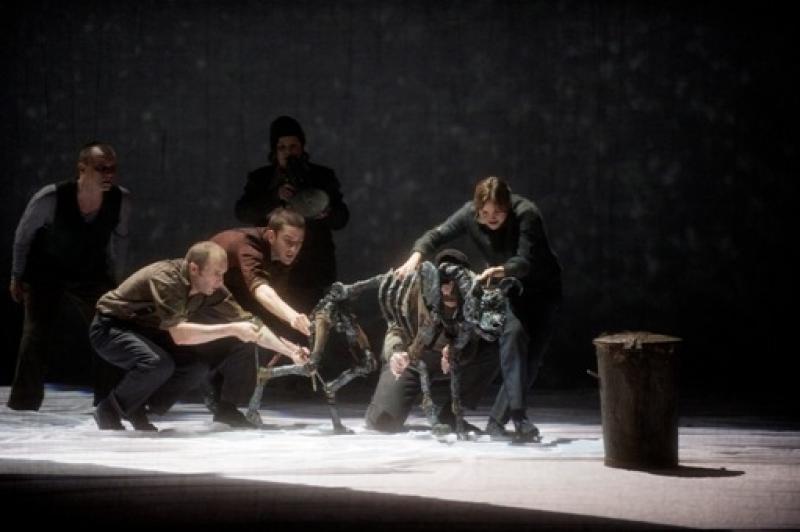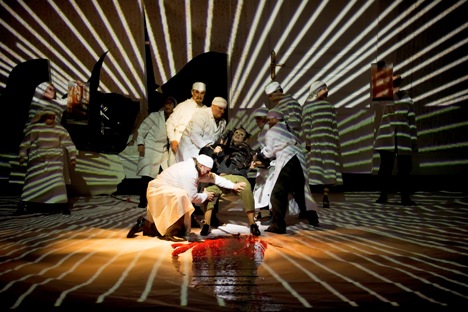Simon McBurney On Creating A Dog's Heart | reviews, news & interviews
Simon McBurney On Creating A Dog's Heart
Simon McBurney On Creating A Dog's Heart
The Complicite director explains how and why his opera debut came to fruition

For anyone who grew up in the former Soviet Union, Heart of a Dog is a seminal text. But it’s also in the great tradition of Gogol and all the Russian satirists. It springs out into absolutely delicious flights of fantasy, but really sharp-edged. The mixture is there in Ostrovsky too: both very dark and very funny and also suddenly beautifully poetic.
Part of satire is the idea that people are being manipulated to certain kinds of opinions, and the whole piece can be taken as a satire on many different forms of manipulation. It’s not as if Bulgakov takes a stand. It’s not at all clear as to who we should side with and care about. In fact it’s constantly fluctuating. But you do get the constant sense of manipulation. The professor has manipulated the dog into a man and then the dog starts to manipulate Soviet ideals of the new communist state and apply them, not because he believes in them but because he wasn’t somewhere warm where he could live and constantly feed. And then the professor from above is manipulated by the big boss.
The nature of the satire is that it is not merely a satire on the social and political situation in the Soviet Union in 1926 but that it really is a human satire. In order to bring that out, rather than doing something which I’d find a little bit of a gimmick – "I’ll update it to modern times to make it relevant" – the key is in how it’s performed. If we see that it is very clearly an artificial construct, you yourself are obliged to imagine the situation. By seeing it made in front of you, by definition it becomes present and you become involved in it. You don't just raise the curtains in 1926 in the Soviet Union. The curtain is already open and you see people putting up lights and you understand that everybody is trying to make this story as present as possible.
So the image of the puppet seemed apposite in many ways. Sometimes people associate the work that I do with a lot of hi-tech wizardry. I don’t know why because for me that’s just a tool, but the truth is I’m interested in the oldest forms of theatre as well as the possibilities our age brings us. I have used and worked with puppets since I began Complicite. Because of the success of War Horse and The Lion King people go, "Oh my goodness me, puppets have just arrived on the London stage." Of course puppets are as old as theatre is: Bunraku, shadow puppets in Indonesia. What has just arrived is the idea that you can put it in the centre of a play.
This dog is starving and thrown onto the rubbish heap. So in our workshop we thought, let’s try and make this job out of rubbish. Out of the garbage came the dog. That eventually became too difficult. Then we went to the next stage and I started to look at pictures of a dog by Giacometti. That gave me an idea that maybe the dog should be fire-blasted with just the skeleton and made with black gaffer tape and bits of plastic. But it really is a dog. I brought in Mark Down who has his own puppetry company called Blind Summit who I have already worked with, and we started to make this creature come to life. Gradually we brought in other puppeteers. In this first workshop I showed Sasha [Raskatov, the composer] what a puppet dog could do and how the singers could relate to it and the voice could be an extension of puppeteering.

The great element in all of this adventure has been in working with the music. I never really understood opera as a child. But very careful musical education by my brother Gerard, who is artistic adviser to the Chicago Symphony Orchestra, opened my eyes to all sorts of different kinds of music. The very first pieces Complicite made were very often inspired by music. Street of Crocodiles was enormously inspired by Schnittke’s Concerto Grosso. I’ve made strange pieces with musicians: a piece about Shostakovich with the Emerson Quartet or working with Esa-Pekka Salonen in Los Angeles on Berlioz.
I suppose it was a question of time before I would accept doing an opera. But having begun work on this one I’ve found it absolutely thrilling to have music as the text. Raskatov’s score’s makes an incredible bridge between 1926 and elements of Soviet music all the way through to an absolute contemporary moment. For me it is completely liberating. Music for me is the key to my imagination, to imagining anything. I don't know the exact neurological processes of the brain but something happens when I’m listening to music that I find I can imagine things in a completely different way. It almost opens your mind to the possibilities of the world. You have a score that tells you absolutely everything you can or you can’t do. You know that you have these parameters that you must work within and there’s nothing better for an artist than to work within certain parameters.
Share this article
Add comment
The future of Arts Journalism
You can stop theartsdesk.com closing!
We urgently need financing to survive. Our fundraising drive has thus far raised £49,000 but we need to reach £100,000 or we will be forced to close. Please contribute here: https://gofund.me/c3f6033d
And if you can forward this information to anyone who might assist, we’d be grateful.

Subscribe to theartsdesk.com
Thank you for continuing to read our work on theartsdesk.com. For unlimited access to every article in its entirety, including our archive of more than 15,000 pieces, we're asking for £5 per month or £40 per year. We feel it's a very good deal, and hope you do too.
To take a subscription now simply click here.
And if you're looking for that extra gift for a friend or family member, why not treat them to a theartsdesk.com gift subscription?
more Opera
 BBC Proms: The Marriage of Figaro, Glyndebourne Festival review - merriment and menace
Strong Proms transfer for a robust and affecting show
BBC Proms: The Marriage of Figaro, Glyndebourne Festival review - merriment and menace
Strong Proms transfer for a robust and affecting show
 BBC Proms: Suor Angelica, LSO, Pappano review - earthly passion, heavenly grief
A Sister to remember blesses Puccini's convent tragedy
BBC Proms: Suor Angelica, LSO, Pappano review - earthly passion, heavenly grief
A Sister to remember blesses Puccini's convent tragedy
 Orpheus and Eurydice, Opera Queensland/SCO, Edinburgh International Festival 2025 review - dazzling, but distracting
Eye-popping acrobatics don’t always assist in Gluck’s quest for operatic truth
Orpheus and Eurydice, Opera Queensland/SCO, Edinburgh International Festival 2025 review - dazzling, but distracting
Eye-popping acrobatics don’t always assist in Gluck’s quest for operatic truth
 MARS, Irish National Opera review - silly space oddity with fun stretches
Cast, orchestra and production give Jennifer Walshe’s bold collage their all
MARS, Irish National Opera review - silly space oddity with fun stretches
Cast, orchestra and production give Jennifer Walshe’s bold collage their all
 Káťa Kabanová, Glyndebourne review - emotional concentration in a salle modulable
Janáček superbly done through or in spite of the symbolism
Káťa Kabanová, Glyndebourne review - emotional concentration in a salle modulable
Janáček superbly done through or in spite of the symbolism
 Buxton International Festival 2025 review - a lavish offering of smaller-scale work
Allison Cook stands out in a fascinating integrated double bill of Bernstein and Poulenc
Buxton International Festival 2025 review - a lavish offering of smaller-scale work
Allison Cook stands out in a fascinating integrated double bill of Bernstein and Poulenc
 Tosca, Clonter Opera review - beauty and integrity in miniature
Happy surprises and a convincing interpretation of Puccini for today
Tosca, Clonter Opera review - beauty and integrity in miniature
Happy surprises and a convincing interpretation of Puccini for today
 Hamlet, Buxton International Festival review - how to re-imagine re-imagined Shakespeare
Music comes first in very 19th century, very Romantic, very French operatic creation
Hamlet, Buxton International Festival review - how to re-imagine re-imagined Shakespeare
Music comes first in very 19th century, very Romantic, very French operatic creation
 Falstaff, Glyndebourne review - knockabout and nostalgia in postwar Windsor
A fat knight to remember, and snappy stagecraft, overcome some tedious waits
Falstaff, Glyndebourne review - knockabout and nostalgia in postwar Windsor
A fat knight to remember, and snappy stagecraft, overcome some tedious waits
 Salome, LSO, Pappano, Barbican review - a partnership in a million
Asmik Grigorian is vocal perfection in league with a great conductor and orchestra
Salome, LSO, Pappano, Barbican review - a partnership in a million
Asmik Grigorian is vocal perfection in league with a great conductor and orchestra
 Semele, Royal Opera review - unholy smoke
Style comes and goes in a justifiably dark treatment of Handelian myth
Semele, Royal Opera review - unholy smoke
Style comes and goes in a justifiably dark treatment of Handelian myth
 Le nozze di Figaro, Glyndebourne review - perceptive humanity in period setting
Mostly glorious cast, sharp ideas, fussy conducting
Le nozze di Figaro, Glyndebourne review - perceptive humanity in period setting
Mostly glorious cast, sharp ideas, fussy conducting

Comments
...
...